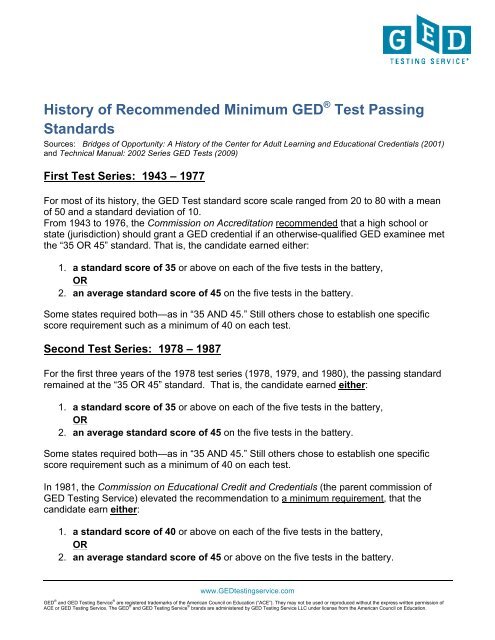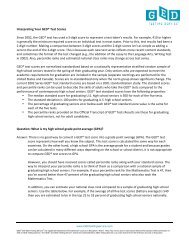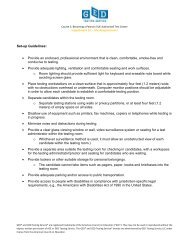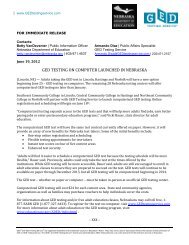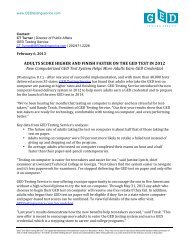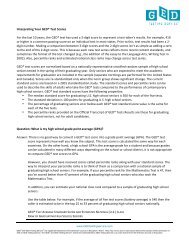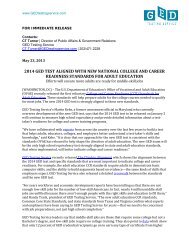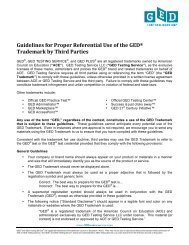GED Test Historical Passing Standards - GED Testing Service
GED Test Historical Passing Standards - GED Testing Service
GED Test Historical Passing Standards - GED Testing Service
You also want an ePaper? Increase the reach of your titles
YUMPU automatically turns print PDFs into web optimized ePapers that Google loves.
History of Recommended Minimum <strong>GED</strong> ® <strong>Test</strong> <strong>Passing</strong><br />
<strong>Standards</strong><br />
Sources: Bridges of Opportunity: A History of the Center for Adult Learning and Educational Credentials (2001)<br />
and Technical Manual: 2002 Series <strong>GED</strong> <strong>Test</strong>s (2009)<br />
First <strong>Test</strong> Series: 1943 – 1977<br />
For most of its history, the <strong>GED</strong> <strong>Test</strong> standard score scale ranged from 20 to 80 with a mean<br />
of 50 and a standard deviation of 10.<br />
From 1943 to 1976, the Commission on Accreditation recommended that a high school or<br />
state (jurisdiction) should grant a <strong>GED</strong> credential if an otherwise-qualified <strong>GED</strong> examinee met<br />
the “35 OR 45” standard. That is, the candidate earned either:<br />
1. a standard score of 35 or above on each of the five tests in the battery,<br />
OR<br />
2. an average standard score of 45 on the five tests in the battery.<br />
Some states required both—as in “35 AND 45.” Still others chose to establish one specific<br />
score requirement such as a minimum of 40 on each test.<br />
Second <strong>Test</strong> Series: 1978 – 1987<br />
For the first three years of the 1978 test series (1978, 1979, and 1980), the passing standard<br />
remained at the “35 OR 45” standard. That is, the candidate earned either:<br />
1. a standard score of 35 or above on each of the five tests in the battery,<br />
OR<br />
2. an average standard score of 45 on the five tests in the battery.<br />
Some states required both—as in “35 AND 45.” Still others chose to establish one specific<br />
score requirement such as a minimum of 40 on each test.<br />
In 1981, the Commission on Educational Credit and Credentials (the parent commission of<br />
<strong>GED</strong> <strong>Test</strong>ing <strong>Service</strong>) elevated the recommendation to a minimum requirement, that the<br />
candidate earn either:<br />
1. a standard score of 40 or above on each of the five tests in the battery,<br />
OR<br />
2. an average standard score of 45 or above on the five tests in the battery.<br />
www.<strong>GED</strong>testingservice.com<br />
<strong>GED</strong> ® and <strong>GED</strong> <strong>Test</strong>ing <strong>Service</strong> ® are registered trademarks of the American Council on Education (“ACE”). They may not be used or reproduced without the express written permission of<br />
ACE or <strong>GED</strong> <strong>Test</strong>ing <strong>Service</strong>. The <strong>GED</strong> ® and <strong>GED</strong> <strong>Test</strong>ing <strong>Service</strong> ® brands are administered by <strong>GED</strong> <strong>Test</strong>ing <strong>Service</strong> LLC under license from the American Council on Education.
This was the “40 OR 45” standard. This permitted the continuation of the “35 AND 45”<br />
standard (at least 35 on every test, with an average of 45 on all tests) set by most U.S. states<br />
at the time. As an example of the variety in passing standards set by the jurisdictions, the<br />
Technical Manual for the 1988 series <strong>GED</strong> <strong>Test</strong>s listed 27 states, the District of Columbia, and<br />
4 other jurisdictions as implementing the “35 AND 45” standard. Other combinations of score<br />
requirements included: 40 minimum score (1); 40 OR 45 (6); 40 OR 50 (2); 45 average (1); 40<br />
AND 45 (16); 40 AND 50 (1); and 42, 45, 45 AND 45 (1). Canada’s jurisdictions chose higher<br />
minimums: 40 AND 45 (1), and 45 minimum (9).<br />
The new standard was in place from 1981 through the end of the Second Series in 1987.<br />
Third <strong>Test</strong> Series: 1988- 2001<br />
From 1988 to 1997 the passing standard continued at the “40 or 45” standard, meaning that<br />
test-takers were required to earn either:<br />
1. a standard score of 40 or above on each of the five tests in the battery,<br />
OR<br />
2. an average standard score of 45 or above on the five tests in the battery.<br />
Beginning in 1997 and continuing through the end of the Third Series in 2001, the nationwide<br />
minimum score requirement was raised – for only the second time in its history – to “40 AND<br />
45,” meaning that test-takers were required to earn both:<br />
1. a standard score of 40 or above on each of the five tests in the battery,<br />
AND<br />
2. an average standard score of 45 or above on the five tests in the battery.<br />
Fourth <strong>Test</strong> Series: 2001 – 2013<br />
In 2002, the fourth test series was released and used a standard score range of 200 to 800<br />
with a mean of 500 and a standard deviation of 100.<br />
At the same time, the new U.S. and IAFAS minimum score requirement was raised – for the<br />
third time in its history – to “410 AND 450,” meaning that test-takers were required to earn<br />
both<br />
1. a standard score of 410 or above on each of the five tests in the battery,<br />
AND<br />
2. an average standard score of 450 or above on the five tests in the battery.<br />
Note: Canada’s requirement on the Fourth Series is a 450 minimum score on both the<br />
individual content area tests and an average for all five tests in the battery.<br />
The Fourth Series is being continued in 2014 and beyond in certain locations and settings, and<br />
the passing standard will remain at the “410 and 450” standard everywhere except Canada,<br />
where it will remain at the 450 minimum standard.<br />
<strong>GED</strong> <strong>Test</strong>ing <strong>Service</strong> ® | www.<strong>GED</strong>testingservice.com 2


